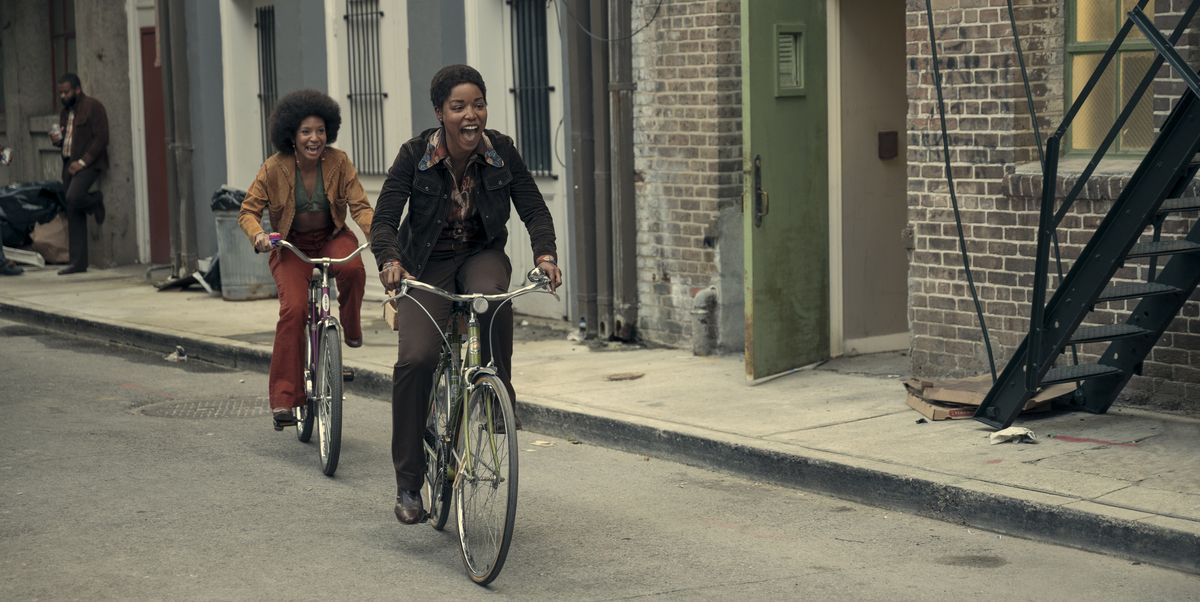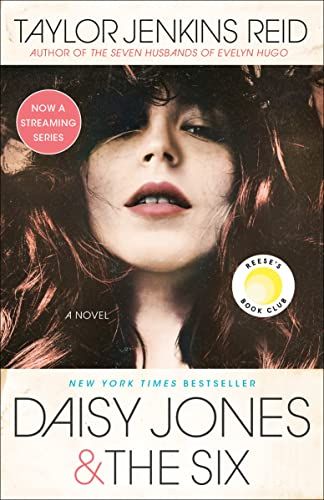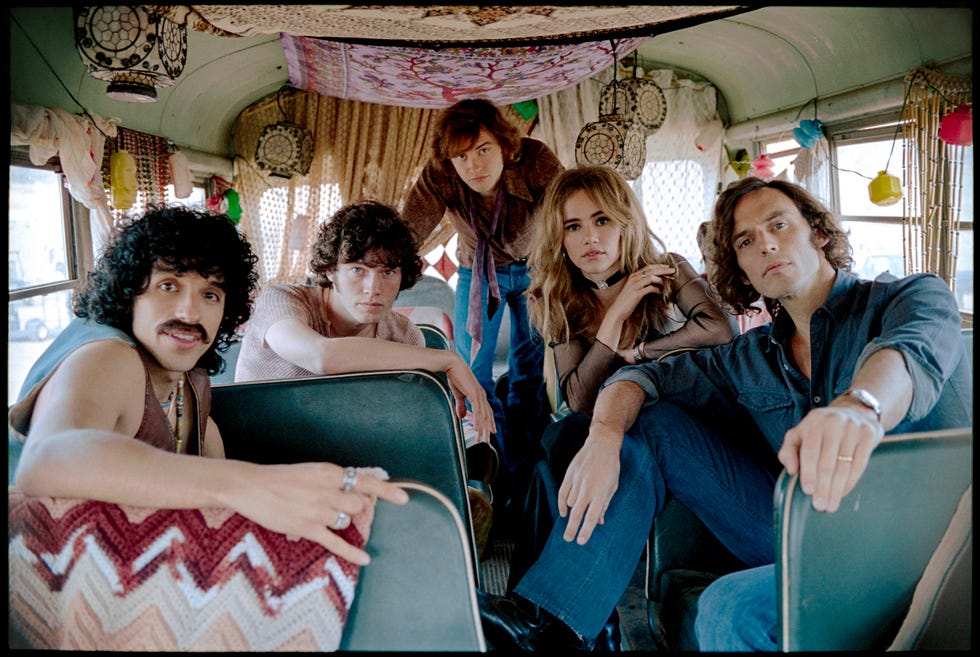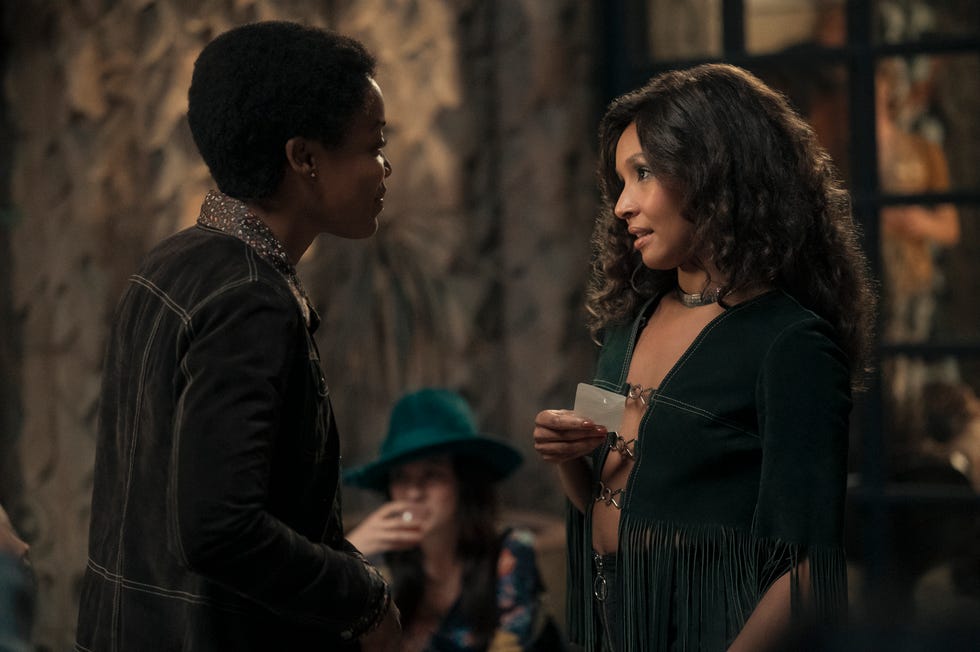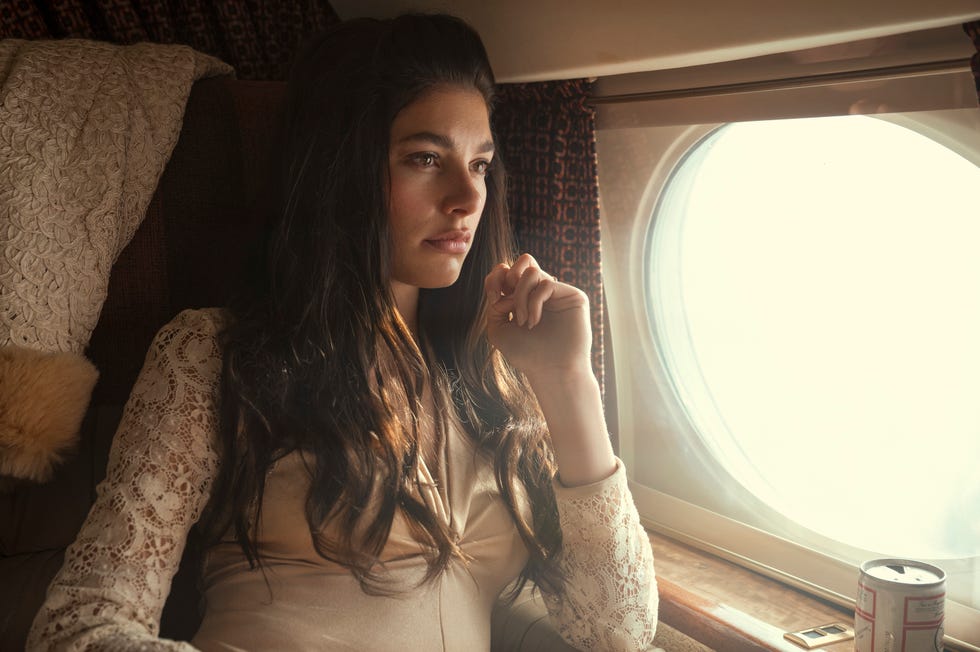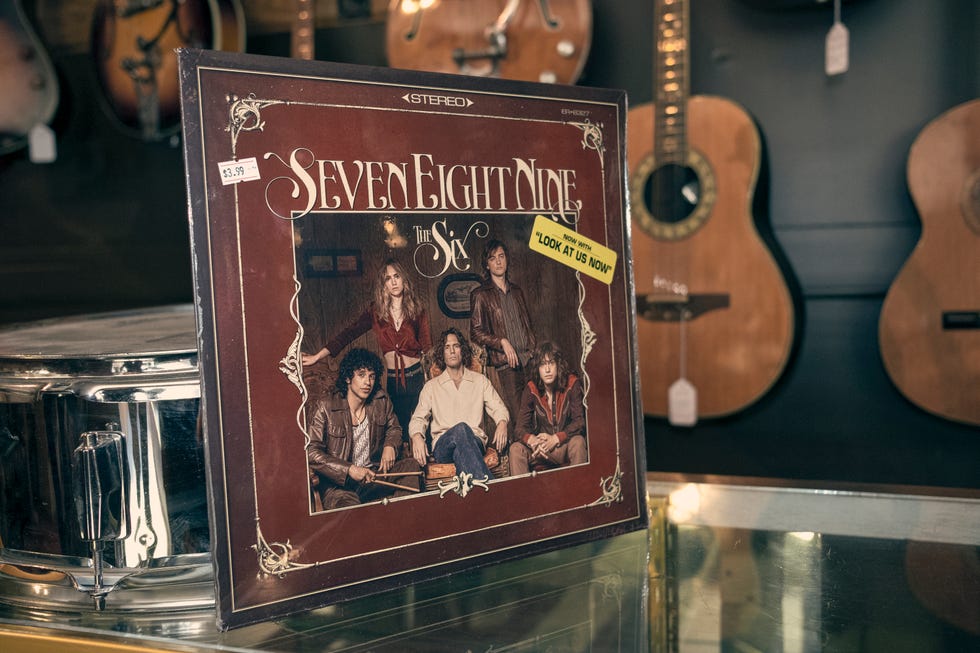Products You May Like
Spoilers ahead.
After tearing through Daisy Jones & the Six, Taylor Jenkins Reid’s 2019 novel about the meteoric rise of a fictional ’70s band not unlike Fleetwood Mac, the biggest question on my mind was: What does this iconic band sound like? Thanks to Prime Video’s new miniseries based on the book, we now have an idea. It turns out, they sound just as cohesive and magnetic as I’d hoped. Daisy Jones & the Six debuted its first three episodes March 3, with more to follow in the coming weeks. This piece will be updated as new episodes are released.
As often happens to fans of a book, we walk into series adaptations warily. Through her words, Reid paints an exceptional picture of a group of musicians with talent and charisma in spades. She details how they come up with individual songs and arrangements, and even includes lyrics to the band’s entire hit album, Aurora. The series’ showrunners, Scott Neustadter and Will Graham, were tasked, then, with making this music, and chemistry, that Reid created so viscerally come alive on screen. They succeeded, but not without making some tweaks to the source material.
With so many characters telling a story over so many years, Neustadter thought Daisy Jones felt ripe for television. “I didn’t know that the two-hour version was ever going to make any sense,” he tells ELLE.com. “I sat with Taylor and I said, ‘I want to live in this world. I want to spend as much time as I possibly can here. And I think that means we have to do it as a TV show.’” This also meant that they could stick to the book’s pacing more closely. In Reid’s novel, Billy and Daisy don’t meet for nearly 90 pages. Neustadter wanted to maintain that tension.
“I think there’s a tendency for the audience to want them to get together right away,” he says. But he wanted to establish their individual worlds first—the Dunne Brothers, Billy and Camila’s courtship, Daisy’s rough upbringing. “Our premise was that the audience would anticipate their getting together and it would be delightful instead of frustrating. When their worlds finally collided, the electricity would really be felt because you knew where they came from and who they were as people and why this was potentially a dangerous meeting.”
As a longtime screenwriter and music buff, Neustadter received an early version of the novel from Taylor’s manager (and the show’s executive producer), Brad Mendelsohn. He was immediately hooked and passed it on to his wife, Lauren Neustadter, President of Film and Television at Hello Sunshine. It was a matter of hours before she read it, passed it along to Reese Witherspoon, and together, they decided to pursue the project.
As executive producer on Daisy Jones, Lauren likens her role to the show’s mom. “I’m the person that tries really to be the glue that holds everything together and solves the problems as they arise,” she says. She was entrenched in the adaptation from the beginning, getting involved in “making sure that we had a very representative and inclusive writer’s room that was adapting this and really fleshing out all of the details and honoring the book, but really thoughtfully bringing it to life.”
Reid’s novel reads like an oral history, a take on VH1’s Behind the Music in written form. With the addition of each character’s voice—from band members to producers, biographers to paparazzi to hotel concierge—Daisy Jones the book gives us a personal look into how a once-in-a-generation band formed, shot to the top, and fizzled fast—and mysteriously. In tone and structure, the show feels like a complement to the book. The interview format sticks. Seeing the characters’ faces—even when they’re simply sighing or smirking in response to a flashback we’ve just been shown—is where the series really shines: closing the gap between the past and present. “The story doesn’t necessarily flow in a completely linear way,” says showrunner Will Graham. “I think the fun opportunity for us was to say, ‘Okay, well the book is what they said happened. We’re going to get a chance to show what actually happened.’ And of course that truth is a little messier.” Here’s a breakdown of some more of the differences between the show and the hit novel.
The Characters
Perhaps one of the first questions on readers’ minds might be: Where is Pete? Pete Loving, Eddie’s brother and the band’s bassist made up the sixth member of what is ultimately renamed The Six. The rest are frontman Billy Dunne, his guitarist brother Graham, drummer Warren, keyboardist Karen, and, early on, guitarist Chuck. In the show, as the group sits in a diner booth, discussing band names to replace “The Dunne Brothers,” they gloss over the notion of a five-member band carrying their new name (giving Camila, Billy’s girlfriend-turned-wife, the honorary sixth spot). In the book, Pete is most memorable for his long-distance relationship with Jenny, the woman he ultimately leaves the band to marry—and for being a conduit to his grudge-bearing brother. His absence isn’t particularly missed, if only because we get a better picture of more minor, though no less significant, characters like Daisy’s friend Simone Jackson and producer Teddy Price. Whereas in the book, Chuck dies during the Vietnam War, on screen, he plays a bassist who decides to go to college to become a dentist, dropping out before the band moves to Los Angeles to make it big. Eddie becomes the de-facto bassist, adding to his grievances against the band, but more specifically its leader, Billy. And then, Warren Rhodes is changed to Warren Rojas, giving him a Latin identity and, in small bits of the show, moments of connection with Camila.
As far as assembling the cast goes, Lauren says, “It was always about choosing the actors that were going to perfectly embody these characters as we imagined them. They really dove in and, to their great credit, every single one of them really became a musician and, together, they became a band.” True to the book, Billy (Sam Claflin)’s presence—his gait, his confidence, his performance—is captivating. In the novel, he’s a musician from a young age, starting a band with Graham, Warren, Pete, and Chuck. The show gives the band’s formation a bit more friction; Graham decides to form it with his friends to get his ex-girlfriend back. Meanwhile, Billy is the unwilling musical mentor, eventually drawn into the fold as the frontman. The woman who ultimately becomes his wife, Camila (Camila Morrone), is captivating and strong and, much like the book, she propels Billy forward through his lows—and there are real lows, like when he finds out he’s about to become a father before going on tour, leading to a downward spiral of drugs and women.
Over in L.A., from the age of fifteen, Daisy Jones (Riley Keough) is as riveted as she is riveting. She resembles a young Stevie Nicks, mesmerized by a world of music that isn’t always as kind to her. True to the book, Daisy is slighted and taken advantage of, giving her the prickly hard-headedness to make Billy’s ultimate match. Her parents all but neglect her. Men steal her song lyrics or elements of her life for their art. Episode 8, similar to the novel, is devoted to Daisy’s story—her disappearance to Hydra, Greece, her whirlwind romance with an Italian prince named Nicky, and the cracks in her relationship with Simone.
Simone, a disco star in the making (played vulnerably by Nabiyah Be), is the first character who sees Daisy for who she is and loves her for it. The show gives her character more air time than the book, allowing us glimpses into the discrimination she’s up against in building her own career, like when she’s uncomfortably forced onto a producer’s lap in the studio or when said producer uses her vocals with a different singer on TV. It also expands on her personal life, as she falls for a DJ named Bernice and moves to New York for love. Her career grows, as she gets people dancing in clubs all around the city and is ultimately offered a record deal. Bringing a queer Black woman’s perspective to the show is a welcome addition, expanding the worldview of the story beyond that of Billy’s and Daisy’s. “In our first conversation with Taylor about the book, we said, ‘What would you like to see more of that you didn’t get to do in the book?’ And she said, ‘More of Simone,’” recalls Graham. “I was personally really proud of and excited to be a part of the Simone storyline. Getting the chance as a queer person to explore the roots of disco and tell at least a little bit of the story of disco coming out of queer and predominantly Black clubs…It’s really a story that hasn’t been told.”
The Love Triangle
In Reid’s novel, Daisy is famous before she is given a microphone. She’s photographed hanging out with rock stars and sent loads of free designer clothing. Runner Records tries to mold her into an Olivia Newton-John type, but Daisy refuses. She turns to excessive drugs, a habit the series shows to a lighter degree at first, but one that builds over time. Daisy rebuffs the notion of sobriety, and Billy spends most of his life after that fated first tour battling his demons, terrified that he could relapse at any moment. This inner struggle is a hard one to capture in a series that has so much else going on, but in the end, it’s one of the things that gives Billy and Daisy common ground, that gives them something to argue about and sing about—and, at times, possibly more than that. The chemistry between these two onscreen remains as palpable as it is on the page. When Daisy overdoses, it isn’t Nicky who she wakes up to, but Billy; this is a departure from the book, but one that underlines how much the two care for and understand each other, possibly more than anyone else in their orbit.
Meanwhile, Camila is further fleshed out in the series, giving greater weight to the love triangle that always threatens to ensue. In the book, Camila is the source of goodness and reason; on screen, she’s given the freedom to be more vulnerable, playing a photographer who has her own artistic ambitions. And despite her hard-headedness about Billy and her expectations for him to show up for her and their family, she harbors her own insecurities about marriage and motherhood. These insecurities soon translate to the blossoming relationship between Billy and Daisy.
Episodes 5 and 6 follow the epic creative collaboration between Billy and Daisy, and the entire band for that matter, once Billy is able to let his guard down and let Daisy in. This, however, comes with emotional baggage. More than once, Billy has to resist the temptation to fall for Daisy and the world of drugs and alcohol she brings with her. Despite his best efforts, though, Billy and Daisy’s attraction is undeniable. Just ask Camila, whose jealousy grows over time. She used to be an integral part of the songwriting process, the first one to hear Billy’s songs come to life; now, she had to find pages of written songs herself or hear finished tracks once they’ve been fully recorded. Camila’s autonomy is where the show departs slightly from the book. On the cover shoot for Aurora, for example, Camila is armed with her camera, taking shots that the official photographer doesn’t—like one of Billy and Daisy fighting behind a rock. This one is obviously the best photo of the bunch, and it’s an example, Camila points out, of how Billy and she used to fight: passionately. One night shortly after the shoot, Camila goes to a bar on her own, where she runs into Eddie, who comforts her—this does not happen in the book. What happens between them remains a question mark, until Eddie all but confirms it in Episode 8 during a private conversation with Camila. But as Camila reflects in her interview 20 years on, “There were just so many secrets. I think I just needed one of my own.”
The Music
“In a novel, you can reference songs and call them amazing, and you just go with it,” says Neustadter. “When we do a TV show version of that, we really have to deliver the songs and make them as good as we keep saying that they are.”
After enlisting the help of producers Blake Mills and Tony Berg, the team walked them through the concept: a band from the ’70s has one really amazing album and they would have to make that album. “These guys really understood the assignment,” Neustadter adds.
The showrunners didn’t want to handcuff the musicians to existing lyrics, but they still made sure that all of the songs had the same narrative functions as they did in the book. The process was an ongoing conversation over nearly three years. “We would say to them, ‘Here’s the song where Billy is really mad at Daisy and he writes this diss track for her and he makes her sing it.’ And other times, they would say, ‘Hey, we wrote this song, is there any place that it could go?’ That two-way street was an unbelievably fun exercise.”
The show is divided into “tracks,” keeping up with the theme of creating an album, something we find the band doing—or preparing to do or longing to do—throughout the first six episodes. It takes the first three episodes to get to Daisy and Billy’s first meeting; until then, we’re privy to the songwriting, guitar-playing, and vocals of these separate entities. The Dunne Brothers pen and perform some catchy tunes (like one called “Look Me in the Eye”) but it’s evident they’ll never make it to rockstar status alone. Daisy has a gift for writing, which she does in a leather-bound red journal, akin to a diary. She just has to prove to herself that she’s good enough. As she says to one of her many suitors in a restaurant parking lot—maybe before she believes it—“I’m not the muse, okay? I’m the somebody.” Afterwards, she walks into a sleepy bar, sits at the piano, and sings her song, slowly gaining the confidence she needs to make it big.
By the end of episode 3, we get a glimpse into “Look at Us Now (Honeycomb),” the single that appears on Aurora, the history-making album that bring Daisy Jones & The Six unprecedented fame, and also the one that tears the band apart. Perhaps it’s the added element of sound and visuals, but the scene in which Billy and Daisy first sing together, each very clearly bringing their life experience to their performance, is captivating. It’s clear that, from this point on, Daisy Jones & The Six a far greater than the sum of its parts. In the book, “Honeycomb” is presented as a bonus track on SevenEightNine, band’s second album, and one that Daisy, who already had her own album by this point, joins right at the end. In the show, it’s the band’s debut chart-topping single—and and Daisy’s first time recording or performing onstage.
As Billy and Daisy set off to write the band’s next album, Aurora, together, the show remains loyal to the book in how this process, not without its bumps, brings Billy and Daisy to a level of closeness that verges on disastrous. Daisy’s pill and booze addiction is now in full swing. Billy is on the brink of temptation; in fact, he kisses Daisy outside the studio, claiming it’s to get her to sing a song with effort, but clearly there’s more to it. In the book, it’s Daisy who initiates the duo’s only, brief kiss during a late night writing session, and Billy pulls away.
Their personal friction bleeds into the music, as both Billy and Daisy use lyrics to express their frustrations with one another. Billy writes “More Fun to Miss,” a song that’s not found in the book, detailing Daisy’s addiction after Billy finds her out of sorts in a hotel pool. Daisy pens “Regret Me” as a reaction to Billy’s unnerving loyalty to Camila. In the book, “Please” is written by Daisy, while onscreen, it’s Billy who pens the song but is reluctant to share it (or take credit for it) with his wife. When Daisy returns from Greece in Episode 8, she insists that “Regret Me” and “Look at Us Now (Honeycomb)” be put back on the set list, two songs that clearly trigger Billy. “Look at Us Now” is left off—for now.
Working out of Sound City—which is also the recording studio featured onscreen—brought a level of authenticity to the show, says Graham. Being a fly on the wall during recording sessions allowed the writers to take lines from real-life interactions between the producers and the actors and use them in the show. In reality, it’s Mills who wrote and produced the entire Aurora album for the series, collaborating with the likes of Marcus Mumford, Phoebe Bridgers, Jackson Browne, and more to rework Reid’s original lyrics and add new elements to the music. As Reid shared when the first Aurora single was released, “Daisy Jones and The Six are real. And they are better than my wildest dreams.” By the end of episode 6, Aurora has been recorded. The bandmates go their separate ways for a much-needed break and it’s only a matter of time before the world gets to know and love this band on an entirely new level, personal drama and all.
This story has been updated.
Nadine Zylberberg is a writer based in New York City. She found her way through the world via movies, words, and chocolate chip cookies. After graduating from the University of Pennsylvania and Oxford, she worked at the New Yorker and the Academy of Motion Pictures, which landed her on the Oscars red carpet for a few years, wondering where they keep snacks in those dresses. She’s always in pursuit of great sample sales and even better stories.
